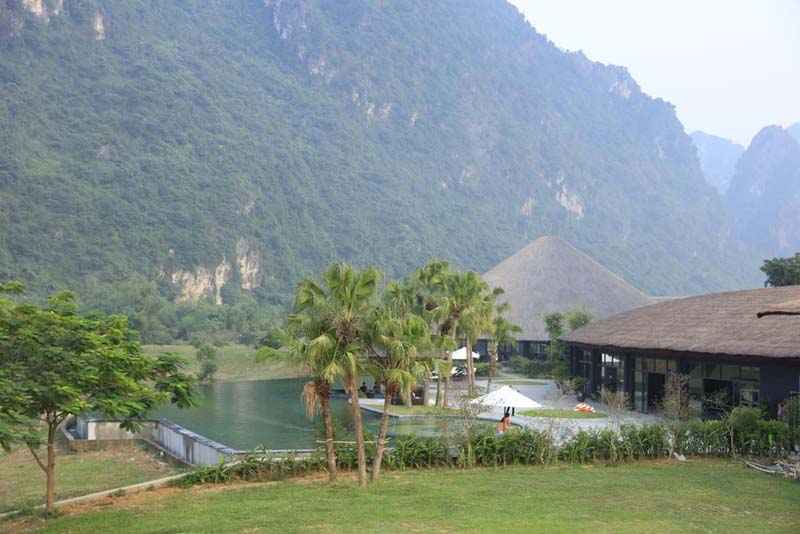
(HBO) - Kim Boi district is home to many beautiful natural landscapes, well-known for folk culture and traditional festivals imbued with Muong ethnic culture. It is endowed with a natural hot spring rated as one of the best mineral water sources in Southeast Asia, a considerable potential and strength to develop tourism. Together with Lac Thuy and Yen Thuy districts, Kim Boi will become a key tourist cluster of the province during the 2014-2020 period with a vision to 2030.
 Serena resort in Sao Bay commune,
a famous tourist destination of Kim Boi district thanks to its beautiful
scenery and hi-end services.
Serena resort in Sao Bay commune,
a famous tourist destination of Kim Boi district thanks to its beautiful
scenery and hi-end services.
A highlight of the district's
tourism is the attraction of investment in building resorts and hot springs. Investors are attentive to such kind of
investment as Serena resort, An Lac resort, Cong Doan hotel, and nursing centre
for veteran revolutionaries. Quite a few visitors are impressed by the beauty
of the nine Tu Son waterfalls like clouds floating in the middle of imposing
mountains, Mat Troi waterfall with wild beauty and clouds all year round; or
Thuong Tien nature reserve with rare and rich flora and fauna, including more
than 80 species of animals and 39 species of plants named in the Red Book of
Vietnam.
It is also a land with a long-standing history, and numerous vestiges
of historical and cultural values. Dong Thech tomb area in Vinh Dong commune
from the late 17th century, with a number of large and small stone
slabs inscribed with Han – Nom scripts, has been recognised as a national
archaeological site.
Apart from hot spring bath, managers
of tourism areas pay special attention to culinary culture with signature
dishes such as Muong Dong bamboo rice, sticky rice, chicken stewed with sour
bamboo shoots, buffalo meat, sour fish, and others that have created an
unforgettable aftertaste in the hearts of visitors. Last year, the district
welcomed over 262,000 tourists, raking in over 175 billion VND.
In order to achieve the goal
of developing high-quality tourism with high-class resorts in combination with community
tourism, the district Party Committee, People's Council and People's Committee directed
further popularising images of local tourism, calling for tourism investment, investing
in technical infrastructure and lodging facilities, and attracting private
investment while developing lodging facilities, restaurants and entertainment
areas. The district strives to welcome about 400,000 visitors and earn about
460 billion VND by 2025, serve around 650,000 tourists and rake in 900 billion
VND by 2030./.
Spanning thousands of hectares and winding gracefully along mountain slopes, hillsides, and riverbanks, the terraced rice fields of Lac Son District present a stunning and captivating beauty. This region, renowned for its remarkable terraced landscapes, is also the centre of Hoa Binh Culture known for numerous archaeological sites.
The life of Mong people in Hang Kia and Pa Co communes of Mai Chau district has improved much thanks to tourism development.
The man-made Hoa Binh Lake, with a water surface area of approximately 9,000 hectares and a capacity of 9.45 billion cubic meters, stretches over 200 kilometers from Hoa Binh to Son La provinces. With the goal of developing into a national tourism area, the Hoa Binh Lake tourism area is expected to not only become the largest tourism centre in the province but also one of the 12 key tourist destinations in the northern midland and mountainous region of Vietnam.
Da Bia hamlet, now Duc Phong, in Tien Phong commune, Da Bac district, was once almost isolated from the outside as the only way to the hamlet was to get a boat ride across the Hoa Binh reservoir. However, as its tourism potential has been unleashed, the hamlet has established itself as one of the most attractive destinations on the tourism map. It has even received the ASEAN Community-Based Tourism Awards in 2019.
In the first 9 months of 2024, Mai Chau district, Hoa Binh province welcomed over 684 thousand visitors to visit and relax. In which, over 516 thousand domestic visitors and more than 168 thousand international visitors. Total revenue from tourism is estimated at over 821 billion VND.
Da Bac district, bestowed with stunning landscapes, is developing ecological and resort tourism offerings. Several tourist sites, put into operation this year, has attracted throngs of high-spending and young domestic visitors.



 Serena resort in Sao Bay commune,
a famous tourist destination of Kim Boi district thanks to its beautiful
scenery and hi-end services.
Serena resort in Sao Bay commune,
a famous tourist destination of Kim Boi district thanks to its beautiful
scenery and hi-end services.